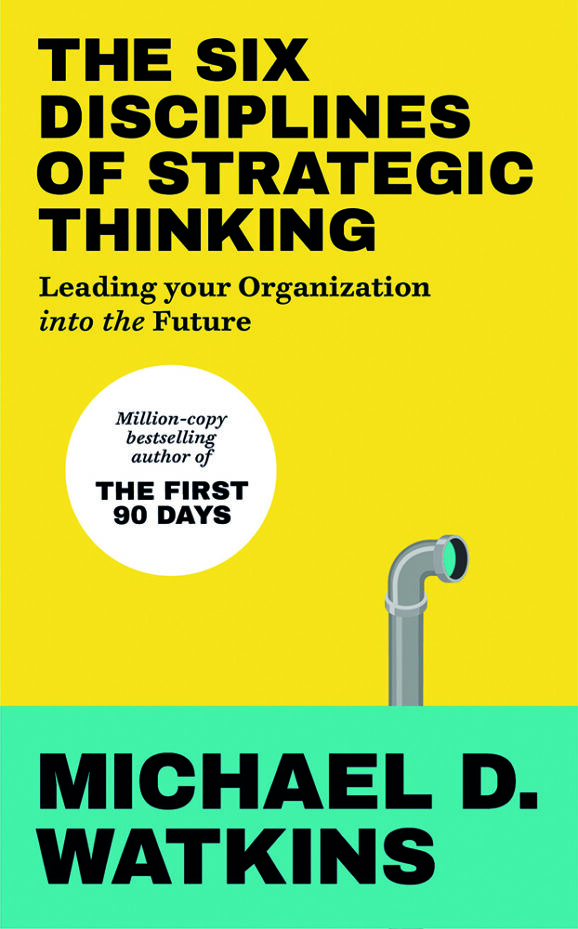Why strategic thinking is a team game

John E. Kaye
- Published
- Executive Leadership, Home

Leadership professor Michael Watkins explains why creating a culture of strategic thinking within an organisation is anything but a top-down process
The ability to think strategically about your organisation’s future isn’t optional – it’s an essential skill. Given the unprecedented economic, political, and social turbulence, strategic thinking has never been more critical. To enable your organisation to thrive amid the chaos, you must focus on what really matters and ensure the right decisions are made at the right times in the right ways for the right reasons.
Unfortunately, too many executives labour under the belief that they must be the sole visionary architects of their organisation’s future. While strong strategic leadership at the top is essential, this “lone genius” model increases vulnerability. Organisations that rely on a single mind for strategic insights become less resilient and adaptable. Forward-thinking leaders understand they must be strategic-thinking skill-builders. This means investing significant resources into developing the strategic capabilities of your team through training and focused application, as well as intentional efforts to cultivate a culture of curiosity and encourage information sharing.
Unfortunately, leaders often fall into classic traps when attempting to develop strategic thinking capabilities in their organisations. Some focus on training initiatives but fail to provide support for applying new skills. Others believe strategic thinking is the domain of a few selected, gifted individuals. And, all too often, an overemphasis on execution hampers the development of a truly adaptable and change-responsive organisation.
Mistaking training for transformation
When leaders recognise the need for improved strategic thinking in their teams, their first instinct is often to invest in training programmes. This is a positive step, but it’s only the beginning. Participants might come out of training with new knowledge about scenario planning tools or advanced market analysis techniques. However, if you haven’t clearly articulated how these new skills will be applied, the result can be misdirected effort and frustration. If the participants in a workshop aren’t given space and built-in structures to nurture this ongoing mindset shift, their newly learned skills – even if initially energising – will atrophy once the urgent pressure of day-to-day operations hits again.
Well-designed workshops provide an exciting jolt of possibility, but true strategic mastery requires continuously weaving those skills into operating rhythms. This might involve dedicated 30-minute “trend exploration” blocks on the calendar, a standing agenda item for “What if?” brainstorming, or simply the ingrained habit of questioning seemingly obvious data points. The point of training isn’t to check a box saying “strategy workshop achieved.” The goal is to change how your leaders and teams think. That requires an investment beyond initial instruction and involves ongoing infrastructure improvements.
Focus on individual excellence, not distributed strength
Faced with the need to build organisational strategic thinking capabilities, many leaders default to a familiar shortcut: identifying one or a few individuals who naturally possess superior strategic thinking skills and tasking them with developing strategy. In doing so, they fall into the trap of believing that all will be well by empowering a few brilliant strategists at the top. The rest of the organisation is effectively told to “execute on the strategy” handed down. However, this approach can have unintended consequences beyond missing out on valuable strategic input from wider teams. No single individual or small group, regardless of talent, can have all the insights needed to develop your strategy amid turbulence. Markets shift, technologies evolve, and hidden threats emerge at a speed that can easily outpace the ability to process everything.
Relying on a few people, therefore, can create a dangerous bottleneck, slowing decision-making and increasing risk. It’s like using a telescope from the crow’s nest of a ship as your sole means of navigation – it’s powerful, but provides a limited view. Strategies created in isolation, disconnected from daily on-the-ground market realities, quickly become outdated. Employees closest to customers, supply chains, or competitor trends can offer valuable information about subtle shifts that designated strategists might miss. This disconnection creates a dangerous feedback loop – strategies uninformed by frontline experience will feel irrelevant to daily work, discouraging employees from thinking strategically.
The best strategic insights often come from debate, where differing perspectives challenge assumptions and push ideas beyond their initial boundaries. Limiting input to a select few stifles creative problem-solving. So, you should seek to foster a culture where differing views are respectfully considered and space is given to ‘what if’ explorations.

Failing to build a culture of curiosity
The relentless drive for short-term results often leaves little room for reflection and innovation. By focusing on immediate problem-solving and action, leaders may unintentionally signal that curiosity is a distraction. To unlock the strategic potential of your organisation, you must actively combat this mindset. Be sure, for example, to encourage questions that reveal gaps in the current strategy, even if they don’t immediately generate solutions. Doing so sends a clear message that the path to high performance is paved with curiosity and questions.
Seek to encourage carefully designed tests of long-held assumptions, acknowledging that even those experiments that “fail” offer valuable strategic information. This will reinforce that you value continual learning and refinement of your organisation’s understanding of the shifting landscape.
Recognise, too, that culture change doesn’t happen without role modelling. When leaders are transparent about their evolving understanding of the market, openly engage with thoughtful critiques of current methods, and actively seek input from across the organisation, they role model the curiosity their teams need to succeed.
Not promoting transparent information flow
Strategic thinkers need high-quality, comprehensive, up-to-date information about emerging trends and opportunities. Creating accessible sources of information on competitor moves, market trends, and internal performance empowers more people to think strategically. You must fight data hoarding – when access to critical information is guarded, only those with enough status to fight for it will utilise information strategically.
A related imperative is to combat the “silo” effect where insights remain confined to departments. You can encourage cross-pollination of information, for example, by sharing curated, high-level “what’s changing” data company-wide. This helps even the most task-focused employees remain alert to potential developments.
Be sure that information flows are bidirectional. It’s equally important that those on the “front lines” have simple mechanisms to communicate their observations to decision-makers. A new customer complaint pattern may indicate a need for strategic changes beyond what anyone at higher levels has noticed. This open-looped flow allows the cumulative knowledge of your workforce, not just those at the top, to drive your strategy.
In conclusion, strategic thinking organisations move beyond relying on the capabilities of one or a few individuals. Leaders who invest in skill development and application, build cultures of curiosity, and encourage information sharing create organisations that can thrive in times of rapid change.


About the author
Michael Watkins is a Professor of Leadership at the International Institute for Management Development (IMD) Business School, and author of ‘The Six Disciplines of Strategic Thinking’.
RECENT ARTICLES
-
 Your roadmap to better management
Your roadmap to better management -
 Navigating the complexities of cross-cultural management
Navigating the complexities of cross-cultural management -
 Time to hire an A-team C-suite?
Time to hire an A-team C-suite? -
 Why strategic thinking is a team game
Why strategic thinking is a team game -
 Prioritising the golden thread
Prioritising the golden thread -
 The shadows we cast as leaders
The shadows we cast as leaders -
 Are referrals a risky business?
Are referrals a risky business? -
 Value your team as much as your customers
Value your team as much as your customers -
 Deliver with aplomb
Deliver with aplomb -
 Helping the business world’s squeezed middle
Helping the business world’s squeezed middle -
 Can stress boost organisational performance?
Can stress boost organisational performance? -
 A roadmap to marketing in times of turmoil
A roadmap to marketing in times of turmoil













